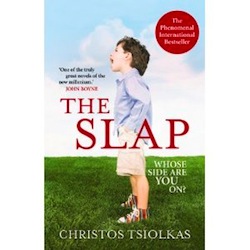 Published: 2010
Published: 2010
Author: Christos Tsiolkas
A nasty book with no redeeming features
One of last year’s big publishing hits was Christos Tsiolkas’ The Slap. It won the Commonwealth Writers’ Prize, was longlisted for the Man Booker Prize and author John Boyne called it “one of the three or four truly great novels of the new millennium”. Added to the great buzz surrounding it was the compelling moral dilemma of whether it is ever right to physically chastise a child, especially one who is not your own. I was really looking forward to this book but I was thoroughly disappointed when I read it.
A middle-class Australian couple holds a barbecue for some friends and family where one of children attending is obnoxious, bullying and threatening. In a moment of frustration a man slaps him. The parents of the boy contacts the police and the group of friends find their opinions and loyalties split.
It is a great premise, but The Slap is rotten book. All of the adult characters are vile, I can’t think of one who has any redeeming qualities whatsoever. They take drugs, cheat on their spouses, beat each other up, are hate-filled and consequently hateful. When the titular slap took place I had some degree of sympathy with the man who steps in to protect his child, but then we find out that he’s a coke-snorting, hard-drinking womaniser and any question about his actions being out of character completely disappear.
Each chapter is narrated by a different character. The relief felt when we leave one self-obsessed cretin behind is replaced with a deep sinking feeling when we discover that the next character is no better. I don’t think I’ve ever read a book with quite so many despicable characters. If this is a reflection of the Australian middle-classes then I’m glad I live 10,000 miles away!
The language also turned me off. Those of you who know me can testify that I’m not a prude. I can swear with the best of them and I’m not ashamed of it but the sheer amount of cursing in this novel made even me feel uncomfortable. Swearing may be big and funny, but it’s really not clever. Tsiolkas seems to think it is and he couldn’t be more wrong.
I have no idea what was going through the minds of reviewers who praised this book or judges who awarded it prestigious titles. It is a thoroughly nasty and unpleasant story which says nothing about tensions in multicultural Australia or moral dilemmas about child-rearing. It’s utterly vile and should be avoided at all costs.


Ugh, I don’t think I’ll enjoy this one either Louise, I have very low tolerance for foul language in any format. I hope they won’t turn this into a movie!
Its already been turned it into a TV series and there is talk of a movie.
I don’t mind bad language normally but this was over the top and made me feel very uncomfortable. Just nasty through and through.
Wow, you really hated this one! I’m glad I listened to the reviews and never got this, even though the premise sounded interesting and something I’d usually enjoy reading. A certain amount of nastiness gives a novel some teeth, but it needs a few good characters to balance it out. This definitely sounds like one to avoid!
It’s really unlike me to hate a book quite so much and I think you’ve hit on the major problem, there were no good characters at all. I was so disappointed as the premise really did appeal to me.
I was pretty horrified by the male characters who were all despicable, while the the females were superficial or materialistic. While I thought the premise and the context were interesting, the story was blown out of shape by caricatures instead of real people, to the degree where the ‘ethnic’ groups Tsiolkas as trying to normalise lacked credibility, let alone being likeable at all.
I loved some of the language, but don’t think he should have gotten away with parts of it. Much more readable is Ellot Perlman’s Seven Steps of Ambiguity.